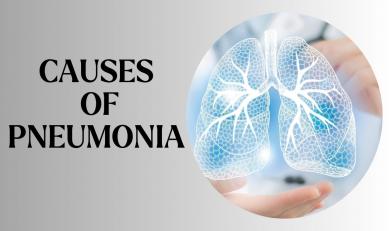

17 Jul, 2024
Pneumonia is a serious respiratory condition that affects millions of people worldwide each year. Understanding its causes is crucial for prevention and early intervention. In this blog, we will delve into the various factors that can lead to pneumonia, including infections, environmental factors, and underlying health conditions.
The primary cause of pneumonia is infection by various pathogens. These include bacteria, viruses, fungi, and, in rare cases, parasites.
Bacterial Pneumonia:
Bacteria are the most common cause of pneumonia in adults. The most prevalent bacteria causing pneumonia is Streptococcus pneumoniae. Other bacteria such as Haemophilus influenzae and Legionella pneumophila can also cause pneumonia. Bacterial pneumonia often develops quickly and can lead to severe symptoms.
Viral Pneumonia:
Viruses are a common cause of pneumonia, especially in young children and the elderly. Influenza viruses, respiratory syncytial virus (RSV), and coronaviruses (including SARS-CoV-2, which causes COVID-19) are notable culprits. Viral pneumonia can range from mild to severe, and secondary bacterial infections are common.
Fungal Pneumonia:
Fungi can cause pneumonia, particularly in individuals with weakened immune systems. Fungal pneumonia is more common in certain geographic areas. For instance, Histoplasma capsulatum is prevalent in the Ohio and Mississippi River valleys in the United States, while Coccidioides species cause valley fever in the southwestern U.S.
Exposure to certain environmental factors can increase the risk of developing pneumonia.
Pollution and Air Quality:
Poor air quality, including high levels of pollution and exposure to smoke, can damage the respiratory system and increase susceptibility to infections. People living in urban areas with high pollution levels are at greater risk.
Occupational Hazards:
Certain occupations expose individuals to harmful substances that can lead to pneumonia. For example, construction workers might inhale dust and mold, while healthcare workers are at higher risk of contracting infectious agents.
Certain health conditions and lifestyle factors can predispose individuals to pneumonia.
Chronic Diseases:
Chronic diseases such as asthma, chronic obstructive pulmonary disease (COPD), heart disease, and diabetes can weaken the immune system and make individuals more susceptible to pneumonia.
Immunocompromised States:
People with weakened immune systems, including those undergoing chemotherapy, organ transplant recipients, and individuals with HIV/AIDS, are at higher risk of developing pneumonia.
Age and Lifestyle Factors:
Both very young children and the elderly are at increased risk of pneumonia due to their relatively weaker immune systems. Lifestyle factors such as smoking and excessive alcohol consumption can also impair the immune system and lung function, increasing the risk of pneumonia.
Pneumonia acquired in healthcare settings, known as healthcare-associated pneumonia (HCAP), can occur in hospitals, nursing homes, or outpatient clinics. This type of pneumonia is often caused by multidrug-resistant bacteria, making it more challenging to treat.
Ventilator-Associated Pneumonia (VAP):
Patients on mechanical ventilation are particularly susceptible to pneumonia. VAP occurs when pathogens enter the lungs through the ventilator tube, leading to infection.
Hospital-Acquired Pneumonia (HAP):
HAP occurs 48 hours or more after admission to a hospital and was not present at the time of admission. It is often caused by bacteria that are resistant to antibiotics, requiring more complex treatment.
Pneumonia is a multifaceted disease with various causes, including infectious agents, environmental factors, and underlying health conditions. Understanding these causes is vital for prevention, early detection, and effective treatment. By taking preventive measures such as vaccination, maintaining good hygiene, and avoiding exposure to known risk factors, individuals can significantly reduce their risk of developing pneumonia. If you or a loved one experiences symptoms of pneumonia, seek medical attention promptly to ensure proper diagnosis and treatment.